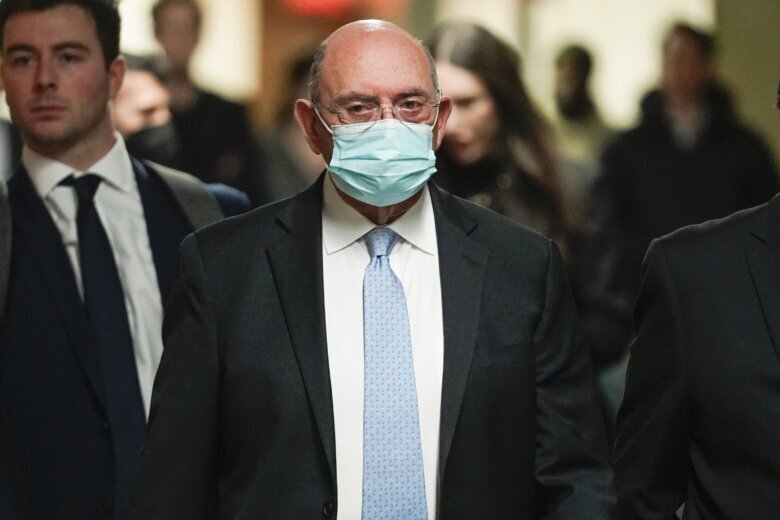
NEW YORK (AP) — Allen Weisselberg, the former chief financial officer of Donald Trump’s company, pleaded guilty Monday to lying under oath during his testimony in the ex-president’s New York civil fraud case. His plea deal will send him back to jail but does not require that he testify at Trump’s hush-money criminal trial.
Weisselberg, 76, pleaded guilty in state court in Manhattan to two counts of perjury and will be sentenced in April to five months in jail — his second stint behind bars after serving 100 days last year for dodging taxes on company perks.
In pleading guilty, Weisselberg found himself caught again between the law and his loyalty to Trump, whose family employed him for nearly 50 years, sent him into retirement with a $2 million severance and has continued to pay his legal bills. His plea to perjury is further evidence that, rather than testify truthfully in a way that might harm his old boss, he was willing to again spend a chunk of his golden years in jail.
“It is a crime to lie in depositions and at trial — plain and simple,” Manhattan District Attorney Alvin Bragg’s office said in a statement.
Weisselberg’s plea agreement does not require him to cooperate or testify at the hush-money trial, which is scheduled to begin March 25. Prosecutors promised not to prosecute him for other crimes he might have committed in connection with his employment at the Trump Organization.
In court Monday, Weisselberg admitted lying under oath on three occasions while testifying in a lawsuit brought against Trump by New York Attorney General Letitia James — in deposition testimony in July 2020 and May 2023 and on the witness stand at the trial last October.
However, to avoid violating his probation in the tax case, he agreed to plead guilty only to charges related to his 2020 testimony.
“Allen Weisselberg looks forward to putting this situation behind him,” his lawyer Seth Rosenberg said in a statement.
Trump’s lawyers argued Weisselberg did nothing wrong and was targeted by Bragg, a Democrat, “in a tyrannical attempt” to impede Trump’s presidential campaign.
“This plea was no doubt extorted by threatening an elderly and innocent man with immediate and lengthy incarceration,” Trump lawyer Christopher Kise said. “Such alarming, shameful and oppressive tactics have no place in our justice system and expose the citizens of New York to irreparable and life-altering harm.”
Weisselberg surrendered to the D.A.’s office Monday morning and entered court in handcuffs and a mask. He admitted lying when he testified he had little knowledge or awareness of how Trump’s Manhattan penthouse came to be valued on his financial statements at nearly three times its actual size.
“You knew that testimony was false?” Judge Laurie Petersen asked Weisselberg on Monday.
“Yes,” Weisselberg replied.
Weisselberg will be formally sentenced April 10. In agreeing to a five-month sentence, prosecutors cited Weisselberg’s age and willingness to admit wrongdoing. In New York, perjury is a felony punishable by up to seven years in prison.
As Weisselberg was pleading guilty Monday, the Supreme Court restored Trump to the ballot in Colorado after the state removed him over his efforts to overturn his 2020 presidential election loss.
The judge in the civil fraud case ruled last month that Trump, Weisselberg and others schemed to deceive banks, insurers and others by lying about Trump’s wealth on financial statements used to make deals and secure loans.
Along with penalizing Trump $455 million, Judge Arthur Engoron ordered Weisselberg to pay $1 million — the amount of severance he has received so far. Trump, Weisselberg and their co-defendants are appealing.
In his decision, Engoron wrote that he found Weisselberg’s testimony “intentionally evasive, with large gaps of ‘I don’t remember.’”
The judge wrote that Weisselberg’s severance agreement “renders his testimony highly unreliable” because it bars him from voluntarily cooperating with law enforcement.
“The Trump Organization keeps Weisselberg on a short leash, and it shows,” Engoron wrote.
Trump’s Manhattan penthouse was valued on his financial statements from at least 2012 to 2016 as though it measured 30,000 square feet (2,800 square meters).
Kevin Sneddon, a former managing director of Trump’s real estate brokerage arm, testified that Weisselberg provided the larger figure. Sneddon recalled Weisselberg asking him in 2012 to calculate the triplex’s value. He said when he asked for its size, Weisselberg replied: “It’s quite large. I think it’s around 30,000 square feet.”
However, Weisselberg got an email early in that same year with an attachment including a 1994 document that pegged Trump’s apartment at 10,996 square feet (1,022 square meters).
Weisselberg testified that he recalled the email, but not the attachment, and that he didn’t “walk around knowing the size” of the apartment.
After Forbes magazine published an article in 2017 disputing the size of Trump’s penthouse, its estimated value was subsequently cut from $327 million to about $117 million on Trump’s financial statement.
As Weisselberg was testifying, Forbes published an article on its website with the headline: “Trump’s Longtime CFO Lied, Under Oath, About Trump Tower Penthouse.”
Jury selection in Trump’s hush-money case is set to start in three weeks. The first of Trump’s four indictments to go to trial, it involves accusations that Trump falsified company records to cover up payments made during the 2016 campaign to bury allegations of extramarital sexual encounters. Trump, the Republican presidential frontrunner, has pleaded not guilty and denies wrongdoing.
Former Trump lawyer and fixer Michael Cohen has said Weisselberg had a role in orchestrating the payments. Weisselberg has not been charged in that case. Neither prosecutors nor Trump’s lawyers have indicated they will call Weisselberg as a witness.
Prosecutors have suggested in court papers that they plan to show jurors “handwritten notes” they claim Weisselberg wrote during a January 2017 meeting with Cohen. Trump’s lawyers have said the notes are hearsay unless Weisselberg testifies.
Weisselberg went to jail last year after pleading guilty to evading taxes on $1.7 million in off-the-books compensation from the Trump Organization. Prior to that, he had no criminal record.
Under that plea deal, Weisselberg was required to testify as a prosecution witness at a trial that led to the Trump Organization’s conviction on charges of helping executives evade taxes. He did so carefully, laying out the facts of his own involvement but telling jurors Trump was unaware of the scheme.
He left New York City’s notorious Rikers Island in April 2023.
___
Associated Press writers Jennifer Peltz and Michelle L. Price contributed to this report.
___
This story has been corrected to show that Weisselberg pleaded guilty to two counts of perjury, not five, and that they occurred during a deposition, not the trial.
Copyright © 2024 The Associated Press. All rights reserved. This material may not be published, broadcast, written or redistributed.







